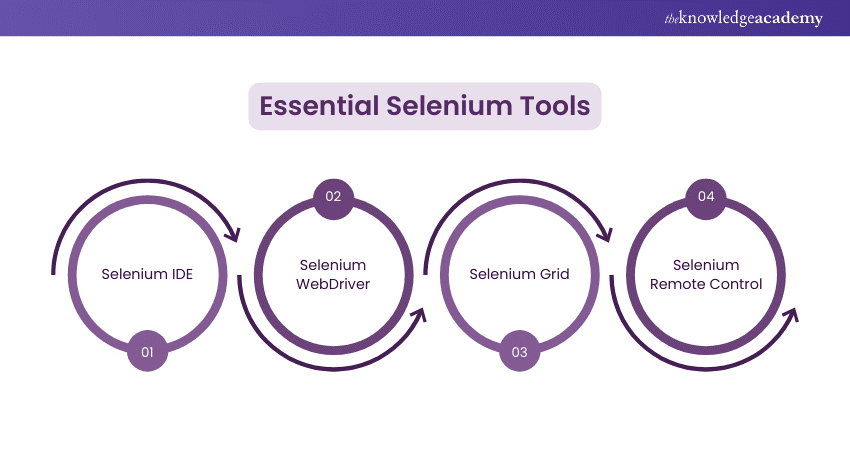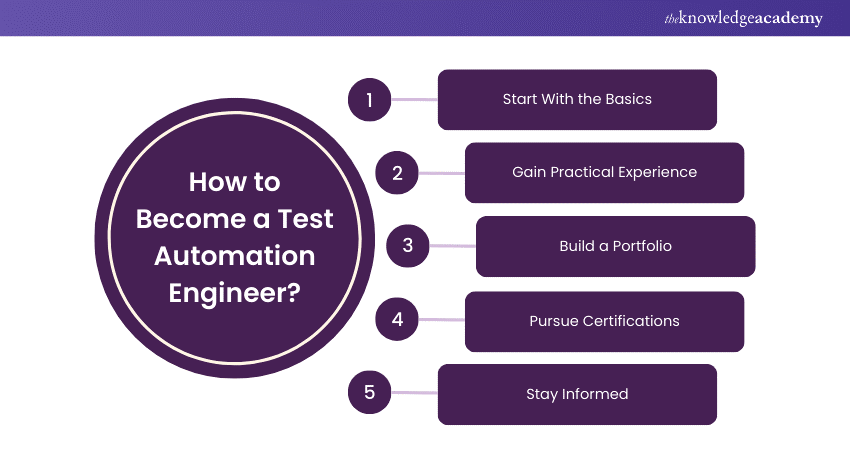We may not have the course you’re looking for. If you enquire or give us a call on +971 8000311193 and speak to our training experts, we may still be able to help with your training requirements.
Training Outcomes Within Your Budget!
We ensure quality, budget-alignment, and timely delivery by our expert instructors.

Are you curious about what it takes to ensure software quality and reliability? Enter the world of a Selenium Tester, where precision meets innovation. Selenium Tester Roles and Responsibilities encompass a dynamic range of crucial tasks, specifically when testing contributes 30-60% of software life cycles.
Selenium Testers are the hidden champions who diligently utilise the Selenium tools suite. Be it crafting test cases or maintaining test environments, the Selenium Tester's Roles and Responsibilities are integral to the tech industry’s commitment to excellence. Explore this blog to gain insights into this crucial position that significantly influences our daily technological interactions.
Table of Contents
1) Who is a Selenium Tester?
2) Essential Skills for Selenium Test Automation Engineers
3) Selenium Roles and Responsibilities
4) Benefits of Being a Selenium Test Automation Engineer
5) Steps to Become a Test Automation Engineer
6) Conclusion
Who is a Selenium Tester?
A Selenium Tester, also known as Test Automation Engineer, is a professional responsible for automating Web Application Testing using Selenium, an open-source tool. They ensure the quality and reliability of software by designing and implementing automated test scripts.
Their presence is essential for optimal operation and to achieve the highest quality outcomes from software. They conduct automated tests on both existing and new software through the creation and implementation of programs.
Test Automation Engineers utilise tests to investigate software problems, craft automation scripts, and construct programs in line with established Test Automation standards. In collaboration with Managers and Software Developers, they work diligently to improve the quality of the end product.
Essential Skills for Selenium Test Automation Engineers
Such professionals should possess a blend of technical expertise and problem-solving capabilities. Now, let's explore the important skills they need to excel in this dynamic field:
1) Proficiency in Manual Testing
To become a Selenium Tester, an individual needs to know a lot about manual testing before getting into automation. These specifically include test case design, test case execution, defect reporting, and regression testing.
2) Mastery of Selenium Tools
A Selenium Tester must be well conversant in using Selenium WebDriver and other related tools. Proficiency in those tools allows them to write sturdy and effective automated test scripts.

3) Grasping Business Requirements
To be a Selenium Tester, it is essential to understand both the business and functional needs of the application under test. This also ensures that all conditions are covered in test cases and the application is validated against the right behaviour.
4) Crafting Frameworks
Selenium Test Automation Engineers often need to design and implement testing frameworks to streamline the automation process. This involves selecting an appropriate framework (e.g., Data-Driven, Keyword-Driven, or Hybrid) and structuring the test code for scalability and maintainability.
5) Script Development
Writing and maintaining automated test scripts is a core responsibility of a Selenium Tester. They must possess strong programming skills, usually in languages like Java, Python, or C#, to develop reliable and reusable test scripts.
Transform your career with the comprehensive Selenium Testing Framework Training – join us now!
Selenium Roles and Responsibilities
Selenium Test Automation Engineers play a pivotal role in the Software Development Life Cycle (SDLC). Their responsibilities include:
a) Test Automation development: As a Selenium expert, your primary responsibility is to develop robust Test Automation scripts using Selenium WebDriver. This involves writing efficient code in programming languages like Java, Python, or C# to automate test scenarios for Web Applications.
b) Framework design and implementation: You'll be tasked with designing and implementing Test Automation frameworks such as Page Object Model (POM) or Behaviour-Driven Development (BDD) frameworks. These frameworks provide structure and scalability to your Selenium tests, making maintenance and execution more manageable.
c) Test script maintenance: Ensuring the reliability and stability of test scripts is crucial. This involves regular maintenance and updates to accommodate changes in the application under test or to enhance test coverage. Your responsibility includes debugging and fixing issues encountered during script execution.
d) Continuous Integration/Continuous Deployment (CI/CD) Integration: Selenium Testers are often required to integrate automated tests into CI/CD pipelines for seamless and automated testing throughout the development lifecycle. This involves configuring tools like Jenkins or GitLab CI to trigger test execution upon code commits or deployments.
e) Collaboration with Quality Assurance (QA) and development teams: Effective communication and collaboration with QA Engineers and Developers are essential for understanding requirements, identifying test scenarios, and resolving issues. As a Selenium professional, you'll work closely with cross-functional teams to guarantee the reliability and quality of the developed software.
f) Research and implementation of best practices: Staying updated with the current trends, best practices, and advancements in Test Automation is essential. You'll be responsible for researching and implementing industry-standard practices to boost the efficiency and effectiveness of Selenium-based testing within your organisation.
Unlock the power of automated testing with our Selenium WebDriver With Python Training - book your spot now!
Benefits of Being a Selenium Test Automation Engineer
Becoming a Selenium Test Automation Engineer offers numerous benefits. Here are some of those crucial advantages:
a) Increased efficiency: Selenium Test Automation engineers can automate repetitive testing tasks, allowing them to execute tests quickly and consistently. This efficiency leads to quick development cycles and earlier detection of bugs, ultimately saving time and resources.
b) Enhanced test coverage: Automation with Selenium enables engineers to conduct comprehensive testing across different browsers, operating systems, and devices simultaneously. This broad coverage ensures that the application performs reliably across various environments, reducing the risk of compatibility issues.
c) Improved accuracy: Automation eliminates human errors inherent in manual testing processes. Selenium scripts execute tests precisely as programmed, reducing the likelihood of false positives or negatives. This accuracy enhances the reliability of test results and helps maintain the quality of the software product.
d) Cost-effectiveness: While initial setup and implementation may require investment, Selenium automation ultimately reduces long-term testing costs. By streamlining test execution and increasing productivity, organisations can achieve significant savings in manual testing efforts, resources, and time.
e) Continuous integration and deployment: Selenium integrates seamlessly with Continuous Integration (CI) and Continuous Deployment (CD) pipelines, facilitating the rapid delivery of software updates. Automation ensures that tests are run automatically whenever new code is committed, enabling teams to figure out and address issues early in the development cycle.
f) Facilitates regression testing: Selenium Automation is particularly effective for conducting regression testing, ensuring that a slight code change do not impact the existing functionality adversely. By automating regression tests, engineers can quickly identify and resolve any regressions, maintaining the stability and integrity of the application over time.
Supercharge your career in software testing with our Selenium Immersion With C# Course - register today to gain hands-on experience!
Steps to Become a Test Automation Engineer
Besides understanding the crucial facts associated with this career, you must grasp the roadmap to becoming a proficient Selenium Tester. Let's delve into the steps that will guide you towards success in this dynamic field:

a) Begin your journey by thoroughly understanding the fundamental principles of manual testing, programming languages, and Selenium tools. Utilise online courses, tutorials, and books to build a strong foundation in these areas.
b) Put your theoretical knowledge into practice by engaging in real-world projects. Seek internships and freelance opportunities, or contribute to open-source projects to gain hands-on experience with Selenium and related technologies.
c) Demonstrate your proficiency in automation by assembling a portfolio showcasing your projects. Include sample test scripts and automation frameworks to highlight your skills and accomplishments in Selenium testing.
d) Enhance your professional credentials by pursuing certifications, that include the International Software Testing Qualifications Board (ISTQB) Foundation Level, Selenium WebDriver Certification, and so on. These certifications validate your expertise and can significantly bolster your credibility in the field.
e) Keep yourself updated with the current trends and advancements in Test Automation. Attend conferences, participate in webinars, and network with fellow professionals to stay abreast of industry developments and continuously refine your skills.
Conclusion
The Selenium Tester Roles and Responsibilities act as the linchpin to ensure the smooth operation of software applications. By following a structured career path, you can embark on a rewarding journey in the Test Automation field. So, seize the opportunity, embrace the challenges, and pave your way towards a successful Selenium Tester career.
Accelerate your career with our Introduction to Test Automation using Selenium WebDriver Training - sign up now!
Frequently Asked Questions

Automation Testing is particularly useful in scenarios requiring repetitive testing tasks and regression testing. It is equally effective in large-scale projects, where manual testing becomes time-consuming and error-prone.

Various techniques are utilised for Testing, including Black-box Testing, White-box Testing, Integration Testing, Unit Testing, and Acceptance Testing. Each of them serves specific purposes in the Software Development Life Cycle (SDLC).

The Knowledge Academy takes global learning to new heights, offering over 30,000 online courses across 490+ locations in 220 countries. This expansive reach ensures accessibility and convenience for learners worldwide.
Alongside our diverse Online Course Catalogue, encompassing 17 major categories, we go the extra mile by providing a plethora of free educational Online Resources like News updates, Blogs, videos, webinars, and interview questions. Tailoring learning experiences further, professionals can maximise value with customisable Course Bundles of TKA.

The Knowledge Academy’s Knowledge Pass, a prepaid voucher, adds another layer of flexibility, allowing course bookings over a 12-month period. Join us on a journey where education knows no bounds.

The Knowledge Academy offers various Selenium Trainings, including the Selenium Testing Framework Training, Selenium WebDriver with Python Training, and Selenium Immersion with C# Course. These courses cater to different skill levels, providing comprehensive insights into the Selenium Interview Questions and Answers.
Our Programming & DevOps Blogs cover a range of topics related to Selenium Tester, offering valuable resources, best practices, and industry insights. Whether you are a beginner or looking to advance your Selenium skills, The Knowledge Academy's diverse courses and informative blogs have got you covered.
Upcoming Programming & DevOps Resources Batches & Dates
Date
 Fundamentals of Test Automation
Fundamentals of Test Automation
Fri 17th Jan 2025
Fri 4th Apr 2025
Fri 3rd Oct 2025
Fri 12th Dec 2025







 Top Rated Course
Top Rated Course



 If you wish to make any changes to your course, please
If you wish to make any changes to your course, please


